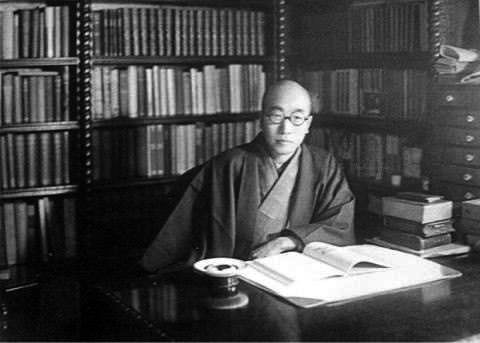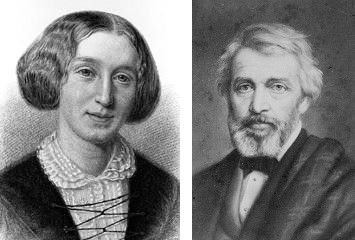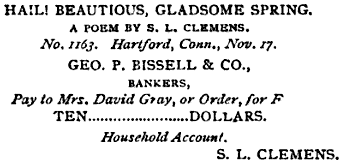
Japanese novelist Tarō Hirai wrote detective fiction under the pseudonym Edogawa Rampo.
That’s a phonetic rendering of one of the genre’s inventors — Edgar Allan Poe.

Japanese novelist Tarō Hirai wrote detective fiction under the pseudonym Edogawa Rampo.
That’s a phonetic rendering of one of the genre’s inventors — Edgar Allan Poe.
A letter from Wallace Stevens to his wife, July 19, 1916:
Eminent Vers Libriste Arrives in Town; Details of Reception
St Paul, Minn. July 19, 1916. Wallace Stevens, the playwright and barrister, arrived at Union Station, at 10.30 o’clock this morning. Some thirty representatives of the press were not present to greet him. He proceeded on foot to the Hotel St. Paul, where they had no room for him. Thereupon, carrying an umbrella and two mysterious looking bags, he proceeded to Minnesota Club, 4th & Washington-Streets, St. Paul where he will stay while he is in St. Paul. At the Club, Mr. Stevens took a shower-bath and succeeded in flooding not only the bath-room floor but the bed-room floor as well. He used all the bath-towels in mopping up the mess and was obliged to dry himself with a wash-cloth. From the Club, Mr. Stevens went down-town on business. When asked how he liked St. Paul, Mr. Stevens, borrowing a cigar, said, ‘I like it.’
Dear Bud:
The above clipping may be of interest to you. Note my address. I am waiting for some papers to be typed — ah! Give my best to the family.
With love,
Wallace
Lewis Carroll discerns a public danger in birthday toasts, from a letter to Gertrude Chataway, Oct. 13, 1875:
I am very much afraid, next time Sybil looks for you, she’ll find you sitting by the sad sea-wave, and crying ‘Boo! hoo! Here’s Mr. Dodgson has drunk my health, and I haven’t got any left!’ And how it will puzzle Dr. Maund, when he is sent for to see you! ‘My dear Madam, I’m very sorry to say your little girl has got no health at all! I never saw such a thing in my life!’ ‘Oh, I can easily explain it!’ your mother will say. ‘You see she would go and make friends with a strange gentleman, and yesterday he drank her health!’ ‘Well, Mrs. Chataway,’ he will say, ‘the only way to cure her is to wait till his next birthday, and then for her to drink his health.’
“And then we shall have changed healths. I wonder how you’ll like mine! Oh, Gertrude, I wish you wouldn’t talk such nonsense!”
This litigious humour is bad enough: but there is one character still worse — that of a person who goes into company, not to contradict, but to talk at you. This is the greatest nuisance in civilised society. Such a person does not come armed to defend himself at all points, but to unsettle, if he can, and throw a slur on all your favourite opinions. If he has a notion that anyone in the room is fond of poetry, he immediately volunteers a contemptuous tirade against the idle jingle of verse. If he suspects you have a delight in pictures, he endeavours, not by fair argument, but by a side-wind, to put you out of conceit with so frivolous an art. If you have a taste for music, he does not think much good is to be done by this tickling of the ears. If you speak in praise of a comedy, he does not see the use of wit: if you say you have been to a tragedy, he shakes his head at this mockery of human misery, and thinks it ought to be prohibited. He tries to find out beforehand whatever it is that you take a particular pride or pleasure in, that he may annoy your self-love in the tenderest point (as if he were probing a wound) and make you dissatisfied with yourself and your pursuits for several days afterwards. A person might as well make a practice of throwing out scandalous aspersions against your dearest friends or nearest relations, by way of ingratiating himself into your favour. Such ill-timed impertinence is ‘villainous, and shows a pitiful ambition in the fool that uses it.’
— William Hazlitt, “On the Conversation of Authors,” 1820

George Eliot’s 1859 novel Adam Bede opens in a carpenter’s workshop:
The concert of the tools and Adam’s voice was at last broken by Seth, who, lifting the door at which he had been working intently, placed it against the wall, and said, ‘There! I’ve finished my door to-day, anyhow.’
The workmen all looked up; Jim Salt, a burly, red-haired man known as Sandy Jim, paused from his planing, and Adam said to Seth, with a sharp glance of surprise, ‘What! Dost think thee’st finished the door?’
‘Aye, sure,’ said Seth, with answering surprise; ‘what’s awanting to’t?’
A loud roar of laughter from the other three workmen made Seth look round confusedly. Adam did not join in the laughter, but there was a slight smile on his face as he said, in a gentler tone than before, ‘Why, thee’st forgot the panels.’
The laughter burst out afresh as Seth clapped his hands to his head, and coloured over brow and crown.
“I found out in the first two pages that it was a woman’s writing,” Thomas Carlyle complained to Willliam Allingham. “She supposed that in making a door, you last of all put in the panels!”
A letter from Sydney Smith to Lady Georgiana Morpeth, Feb. 16, 1820:
Dear Lady Georgiana,– Nobody has suffered more from low spirits than I have done — so I feel for you. 1st. Live as well as you dare. 2nd. Go into the shower-bath with a small quantity of water at a temperature low enough to give you a slight sensation of cold, 75° or 80°. 3rd. Amusing books. 4th. Short views of human life — not further than dinner or tea. 5th. Be as busy as you can. 6th. See as much as you can of those friends who respect and like you. 7th. And of those acquaintances who amuse you. 8th. Make no secret of low spirits to your friends, but talk of them freely — they are always worse for dignified concealment. 9th. Attend to the effects tea and coffee produce upon you. 10th. Compare your lot with that of other people. 11th. Don’t expect too much from human life — a sorry business at the best. 12th. Avoid poetry, dramatic representations (except comedy), music, serious novels, melancholy, sentimental people, and everything likely to excite feeling or emotion, not ending in active benevolence. 13th. Do good, and endeavour to please everybody of every degree. 14th. Be as much as you can in the open air without fatigue. 15th. Make the room where you commonly sit, gay and pleasant. 16th. Struggle by little and little against idleness. 17th. Don’t be too severe upon yourself, or underrate yourself, but do yourself justice. 18th. Keep good blazing fires. 19th. Be firm and constant in the exercise of rational religion. 20th. Believe me, dear Lady Georgiana,
Very truly yours,
Sydney Smith
Edward Lear’s recipe for Gosky Patties, 1872:
Take a pig three or four years of age, and tie him by the off hind-leg to a post. Place 5 pounds of currants, 3 of sugar, 2 pecks of peas, 18 roast chestnuts, a candle, and 6 bushels of turnips, within his reach: if he eats these, constantly provide him with more.
Then procure some cream, some slices of Cheshire cheese, 4 quires of foolscap paper, and a packet of black pins. Work the whole into a paste, and spread it out to dry on a sheet of clean brown waterproof linen.
When the paste is perfectly dry, but not before, proceed to beat the pig violently with the handle of a large broom. If he squeals, beat him again.
Visit the paste and beat the pig alternately for some days, and ascertain if, at the end of that period, the whole is about to turn into Gosky Patties.
If it does not then, it never will; and in that case the pig may be let loose, and the whole process may be considered as finished.
Mark Twain once entered a contest that offered $10 for the best original poem on the topic of spring, “no poem to be considered unless it should possess positive value.” He submitted this:

“It took the prize for this reason, no other poem offered was really worth more than $4.50, whereas there was no getting around the petrified fact that this one was worth $10. In truth there was not a banker in the whole town who was willing to invest a cent in those other poems, but every one of them said this one was good, sound, seaworthy poetry, and worth its face. … Let other struggling young poets be encouraged by this to go striving.”
See Inspiration.